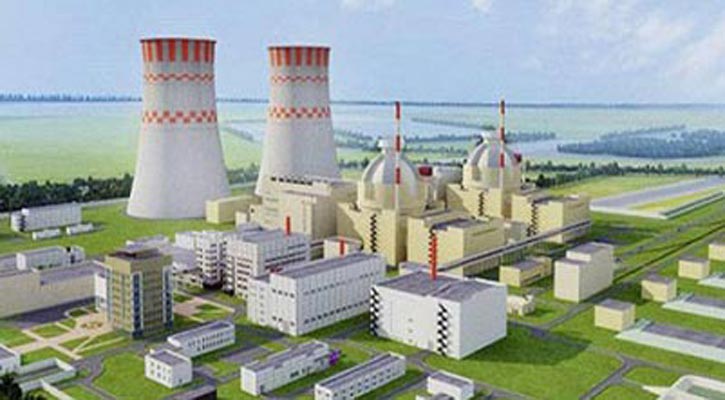Economic Benefits of Rooppur Nuclear Power Plant

The Power System Master Plan (PSMP) 2016 envisaged a strategic plan under which power generation capacity will be 24000 MW by 2021, 40000 MW by 2030 and 60000 MW by 2041. Thus, Rooppur NPP will play an important role in the power sector of the country to ensure energy security of the nation.
The overall development progress of the RNPP is 30 percent, as of September 2020. In the first week of November this year, Rooppur Nuclear Power Plant received the reactor pressure vessel and steam generator for the first unit of its under-construction nuclear power plant. The cargo ship carrying the equipment reached Mongla port and from there the equipment were loaded on a special barge and transported to the Padma river port close to the construction site.
The Rooppur NPP will be an important driver of social and economic development of Bangladesh and make a sizable contribution to the country’s energy mix. The Rooppur NPP have some special economic benefits due to very large generation capacity over a longer service life. It has a service life of main equipment of 60 years without necessity of its replacement. Low operational and maintenance cost adds to the benefits from economic perspective. The power generation from the Rooppur NPP is highly cost competitive compared to that from gas, coal, and imported electricity from India. The Levelized Cost of Electricity is estimated less than 5 taka per unit where the average generation cost of electricity by other means is much higher than this.
Nuclear construction projects are considered as the growth engine for the region where those are constructed. The Rooppur Nuclear Power Plant will accelerate the growth of the country’s industrial sector and thus will contribute to the overall economic development. It will provide employment opportunities for locals and revenues from taxes which will help to support a healthy economy.
The most visible impact of this infrastructure development boom on the economic activity can be perhaps assessed at the local level, in Ishwardi. The project has led to direct employment of close to 14,000 Bangladeshi workers, as per local media reports. In addition, there are more than 3000 foreign nationals working at the project. The rise in employment has given a considerable boost to local economy. As per local media reports, a number of new shopping malls have sprung up catering to substantial presence of the foreign workers and small businesses are witnessing substantive increase in spending by locals employed at the RNPP. Local infrastructure is being developed based on the power plant. The Padma river port, completed recently, is one of the many support infrastructures that have been built for the RNPP. Besides, a railway link will be connected to the construction site of the Rooppur Nuclear Power Plant.
At national level, the project’s long term benefits on Bangladesh’s economy are hard to estimate. However one study found that through multiplier effect in consumption, investment and government expenditure, the change in GDP due to electricity production through Rooppur Power Plant is estimated $1.4 billion per year. The net economic benefit, which is the difference between discounted economic benefit and discounted economic cost, will be approximately $71.4 billion. The marginal impact of each dollar spent in Rooppur Power Plant would be 3.6 against 1.3 for coal based electricity production.
In addition to the considerable expertise the country is gaining through such massive and technologically challenging undertaking, the project is directly contributing to developing a pool of highly skilled labor force. For a rapidly developing economy such as Bangladesh, skilled human resource is of paramount importance in driving the economic growth. The nuclear project will require a large skilled labor force once it becomes operational. To cater to this demand, Bangladeshi universities have enhanced their engineering and nuclear physics departments and few more are adding new courses in disciplines related to nuclear energy and engineering. The RNPP is an important source for knowledge spillover. The Bangladeshi scientists and engineers working closely with the Russian experts on RNPP are gaining valuable insights on planning and executing complex tasks. This experience will be crucial for Bangladesh for developing indigenous capabilities for large scale projects.
Bangladesh plans to raise the per capita income in the country to $12,500 by 2041 rest largely on the scale and speed of industrialization of the economy. Although industrialization is one of the main wheels to an advanced economy, the country faces a severe lack of electricity to feed the looms and the levers. The present capacity of Bangladesh in terms of energy production is not sufficient to power this large scale industrialization. The two units of RNPP, once fully operational by 2024, will add 2400 MW in the country’s energy supply. This addition is particularly crucial for sustaining and expanding the industrial base in and around Pabna which has around 170 heavy, medium and light industries in the zone making Pabna one of the most industrialized cities of Bangladesh. This capacity building of the power production is also complemented by the government’s much needed efforts to modernize the grid infrastructure for electricity distribution which will ensure efficiency in distribution network.
It is suffice to say that the RNPP’s benefits are not limited to contributing to meeting Bangladesh’s energy demands, it creates a good number of employment opportunities, manufacturing capabilities, infrastructural development. The project has become a focal point of new-age of industrialization of the country which will pave the way for sustained economic development.
Source: banglanews24.com
Gov. Site: rooppurnpp.gov.bd
Published by: Chittagong Port Agent









